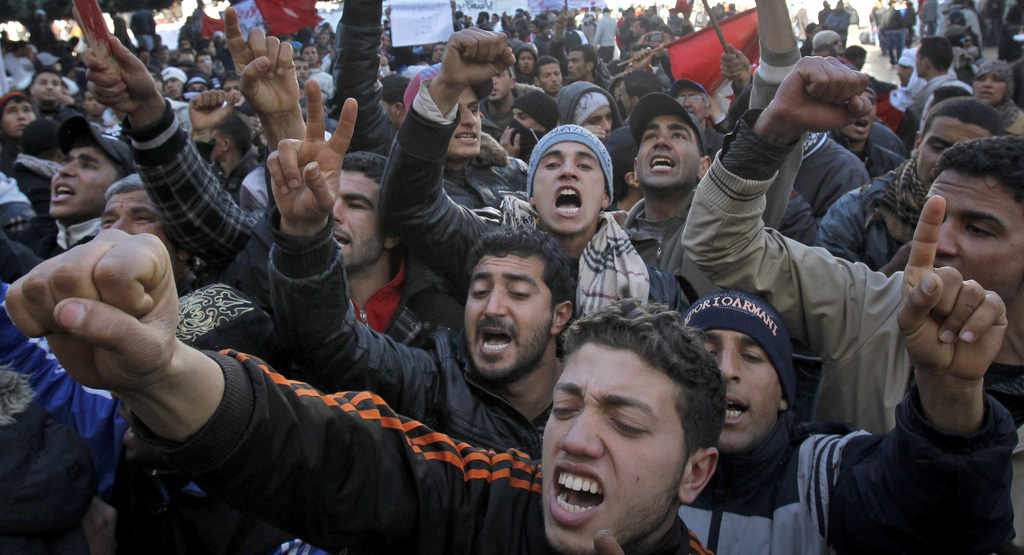Unions fear spread of civil unrest to Europe

The current wave of social unrest in North Africa may spread to Europe unless more jobs are found, according to the international trade union umbrella organisation.
Philip Jennings, secretary-general of the Nyon-based UNI Global Union, told swissinfo.ch that a chronic shortage of work was one reason behind the so-called Jasmine Revolution that recently unseated the Tunisian president.
With unemployment rates around ten per cent in the European Union, European governments should rethink austerity policies and form a new social contract with workers, Jennings said.
Speaking at the 41st World Economic Forum (WEF) annual meeting in Davos, Jennings also praised Switzerland’s labour relations model as a system to be “treasured”.
swissinfo.ch: Is there a danger that social unrest in North Africa could be replicated in Europe?
Philip Jennings: The level of unemployment among young people in North Africa is 45 per cent. There was economic exploitation and those young people were ready to change the world.
In Europe, Britain is in for a difficult time and we are worried about Ireland. Greece is a continuing skirmish between trade union leaders and the government. Politicians saved the financial system but were exhausted by the time they got round to looking at the social downsides.
swissinfo.ch: Could the austerity measures of some EU countries –cutting public sector jobs and services – stir things up further?
P.J.: We understand that there has to be some kind of intervention given the extent that states had to bail out the financial system. But the speed and way it is being done is simply wrong.
There was relief at the economic recovery, but now these [austerity] decisions will penetrate every household. The austerity measures are so profound that we are worried about their social acceptability. People are not seeing the consequences yet, but they are on their way.
swissinfo.ch: So what needs to be done to ease the situation?
P.J.: We should make some very serious political decisions about taxation and empowering working people to negotiate their terms of employment. The growth we saw [before the financial crash] was exclusive and it has to become more inclusive.
The financial and business elite have acted like a huge suction pump and taken a great deal of wealth being produced. Our societies have become hollowed out and the middle class is shrinking into a rump, while a plutocracy at the top are cut off in their own country.
swissinfo.ch: Is Switzerland a model for the world with its low unemployment and harmonious labour relations?
P.J.: In Switzerland, a post-war understanding was reached that there would be social peace, that the labour movement and employers would settle their differences by collective bargaining and negotiation. This should be treasured.
swissinfo.ch: Do you support Swiss unions’ demands for a national minimum wage?
P.J.: There is a general fear that the bottom million is being left out of these [collective bargaining] arrangements with the rise of the services sector, where there are different patterns of employment and working time arrangements.
There seems to be no limit in certain sectors about the depths employers are willing to plunge to not pay people properly. It tends to be in areas of work that are not in the public eye: cleaning, catering, and security. That’s why you need to put in a social floor.
swissinfo.ch: Is it justified for manufacturers to relocate production, and related jobs, to cheaper countries?
P.J.: The rush to cheaper manufacturing has a detrimental effect on the ability to develop quality products and added value – it’s not simply about cost. Why should Swiss manufacturers switch their business model because of a short-term rush to the franc?
There is a growing middle class in India and China that will reach 600 million people in the near future. They will demand products with a certain cachet, so Swiss manufacturers should concentrate on the exclusive quality brand of their products.
The rate of unemployment in Switzerland is 3.6%, compared with around 10% in the US and the EU zone.
There are currently 213 million unemployed workers in the world, according to the International Labour Organization (ILO).
Included in this figure are the 81 million young people currently out of work – the most unemployed ever for this group. The number was boosted by 7.8 million people between 2007 and 2009.
The number of unemployed people rose by 30 million between 2007 and 2009, according to the World Economic Forum.
The worst countries to find a job in are Greece, Italy and the Czech Republic, says recruitment company Manpower.
China, Taiwan, India and Brazil currently offer the best prospects for employment.
WEF also calculates that the world will need 300 million new workers by 2015.
A PriceWaterhouseCoopers survey of global chief executives found that 66% believed there is currently a shortfall of skilled workers.
Europe is expected to lose 48 million workers and gain 58 million new pensioners by 2050.
The recent strikes by lawyers came amid growing unrest following the death of an unemployed 26-year-old university graduate, Mohammed Bouazizi, who set himself alight on December 17 in front of a government building in the central town of Sidi Bouzid.
Bouazizi said he was driven to the act by police who had seized his fruit and vegetable cart over a permit. He died on January 4 of his burns.
His act was embraced by students, professionals and young people who are angry at a shortage of jobs and restrictions on public freedoms.

In compliance with the JTI standards
More: SWI swissinfo.ch certified by the Journalism Trust Initiative












You can find an overview of ongoing debates with our journalists here . Please join us!
If you want to start a conversation about a topic raised in this article or want to report factual errors, email us at english@swissinfo.ch.